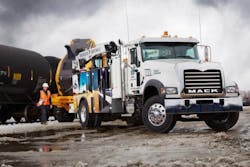EPA Moves to Increase NOx Standards
The Environmental Protection Agency announced a new push to reduce emissions of nitrogen dioxide in heavy trucks, using an “Advance Notice of Proposed Rulemaking” to request input for its Cleaner Trucks Initiative, which would impose new regulations on the diesel engines powering heavy trucks, including those used in construction.
“The trucking industry touches nearly every part of our economy,” said Andrew Wheeler, EPA administrator, in a prepared statement. “A strong and resilient trucking industry is imperative to maintaining a strong and resilient economy. Through this initiative, we will modernize heavy-duty truck engines, improving their efficiency and reducing their emissions, which will lead to a healthier environment.
“The U.S. has made major reductions in NOx emissions, but through this initiative we will continue to reduce emissions, while spurring innovative new technologies, ensuring heavy-duty trucks are clean and remain a competitive method of transportation,” he said.
Said Jason Sloan, executive director of the Association of Air Pollution Control Agencies, in a statement:
“EPA’s announcement on the Cleaner Trucks Initiative is a productive step toward updating standards for on-highway heavy-duty trucks and engines to reduce emissions of nitrogen oxides and particulate matter. As co-regulators under the Clean Air Act, AAPCA’s state and local members have worked diligently to improve air quality, overseeing significant decreases in the emissions and ambient concentrations of the six criteria air pollutants. By seeking efficiency improvements for on-highway heavy-duty trucks and engines, EPA’s Cleaner Trucks Initiative will support environmental agencies in their continued efforts to meet national air quality standards.”
In an event announcing the notice, EPA administrator Andrew Wheeler was joined by representatives from the Truck and Engine Manufacturers Association, American Trucking Association, Diesel Technology Forum, and Owner-Operator Independent Driver Association.
“[T]he Cleaner Trucks Initiative moves forward in setting the vision for the heavy-duty diesel engines of the future as high-value assets which help achieve our nation’s future energy and clean air goals while also expanding economic growth,” said Allen Schaeffer, executive director of the Diesel Technology Forum in a prepared statement. “Today’s action follows support for a new low NOx standard from truck and engine makers and petitions for rulemaking from a number of state and local air agencies.”
Said Bill Sullivan, executive VP of advocacy for the American Trucking Association, in a statement:
“The trucking industry takes clean air seriously and has made significant strides in improving the nation’s air quality over the last 35 years. Since 1985, newly-manufactured trucks have reduced NOx emissions by over 98 percent but our work is not yet done. These reductions have been possible because the EPA has worked with stakeholders—including the trucking industry—to help institute standards that are feasible, achievable and reasonable. ATA is committed to continuing to work closely with EPA on developing the next generation of low-NOx emitting trucks through the Cleaner Trucks Initiative. To this end, the trucking industry seeks one national, harmonized NOx emissions standard that will result in positive environmental progress while not compromising truck performance and delivery of the nation’s goods.”
Jed Mandel, president of the Truck and Engine Manufacturers Association, said in a statement:
“EMA looks forward to working with EPA on potential improvements to the heavy-duty on-highway engine regulations that can reduce the overall costs of compliance, preserve the necessary diversity of the commercial vehicle marketplace, and protect our customers’ need for fuel-efficient, durable and reliable trucks.”
EPA plans to published the proposed standards this year, and published reports suggest final action could be taken in 2021 with implementation in 2027.
Source: Environmental Protection Agency
